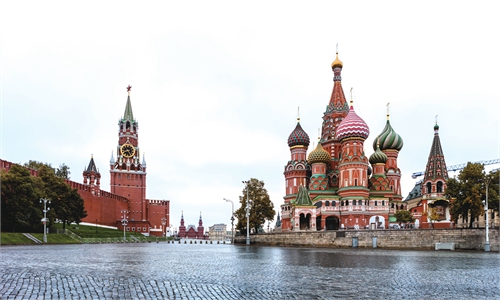Overburdened and overstretched, US in danger of following Soviet path: Retired Russian lieutenant-general

Photo: VCG
Editor's Note:It has been three decades since the disintegration of the former Soviet Union. What is the collective feeling in today's Russian society about the collapse of the Soviet Union? What lessons can China learn from the Soviet Union's disintegration? Evgeny Buzhinsky (Buzhinsky), a retired Russian lieutenant-general and chairman of the Executive Board of the Russian Center for Policy Studies (PIR Center), shared his insight on these issues with Global Times (GT) reporter Lu Yuanzhi. The PIR Center is a leading Russian nongovernmental organization that specializes in the study of global security issues.
GT: Many Russians believed that the US and the West would embrace Russia after the Soviet Union fell apart. But Moscow has not received goodwill from them. What is the root cause of the Western hostility toward Russia? Does such enmity also exist between China and the West?
Buzhinsky: Well, of course, in the time of the Soviet Union, the main contradictions with the West were ideological. After the collapse of the Soviet Union, ideological contradictions disappeared. Simultaneously other kind of contradictions emerged. Russia, with its imperial past, has always been one of the major world powers. As for the US, especially after World War II, the country became one of the leading countries of the world and the leading nation of the so-called collective West.
In the time of the Soviet Union, the Soviet Union equaled practically in almost everything with the US, maybe slightly lagging behind in economy. But as for the armed forces, the Soviet Union was a little bit mightier than the US. So the Soviet Union could counterbalance the US in the world affairs. The Soviet Union also was the leader of the Eastern block of socialist countries.
After the collapse of the Soviet Union, the US remained the only superpower, and wanted Russia to be one of the Western countries that follows the US lead. That's the desire of the US.
When we speak about the West, I speak most of the US, because the US, as the recognized leader of the collective West, was against the nature of Russia. Economic hardships have prevented Russia from being equal to the US. But in the beginning of 2000s, Russia started to boost the recovery of its economy, and to modernize its armed forces. In 2007, President Vladimir Putin delivered his famous speech, in which he said that Russia does not agree to the US lead. That was the starting point for the actual confrontation between the US and Russia, which continues and escalates till today.
During the Cold War era, especially in the 1970s, former US president Richard Nixon and former US secretary of state Henry Kissinger decided to make friends with China and to actually get China involved in confronting the Soviet Union, and they succeeded.
We had very tense relations with China from the mid 1960s to late 1980s of the last century. But now the US sees that from a different point of view. China actually has already become the leading nation of the world, in terms of financial resources, intellectual resources, armed forces, and modernization and some other aspects. Under the new circumstances, the US wants Russia to be on their side to confront China.
Now the US does not conceal that China is their rival No.1, although you used to have a very happy time with the US.

Evgeny Buzhinsky Photo: Courtesy of Buzhinsky
GT: In your opinion, what is the collective feeling in today's Russian society about the disintegration of the Soviet Union?Buzhinsky: Personally, I think there are some liberal-minded people who are not sorry about the collapse of the Soviet Union. They believe that the Soviet Union was not a democratic society, so on and so forth. As for my generation and the generation of my children, even the young generation who did not live in the time of the Soviet Union but have heard constantly stories about the Soviet Union, they would say that in the time of the Soviet Union, the society was fairer and more humane.
Everybody was sure about their future, everybody had a job, everybody had pension. So I would say that more than half of the population feel sorry about the collapse of the Soviet Union. I think that things could have been done differently.
GT: Now, many analysts believe that the US is waging a new cold war against China. Do you think so? What lessons do you think China can learn from the collapse of the Soviet Union?
Buzhinsky: Yes, I think so. But as for China, the main ideology is the Communist ideology, and the Communist Party of China is the leading party of China. You have ideological differences with the US and with the collective West.
Like the Soviet Union 30 years ago, China has its own "cold war" with the US. I'm sure about that.
I think many in Russia think that the Chinese example is more productive. And if the leadership of the Soviet Union led by Mikhail Gorbachev had followed the Chinese pattern, the result would have been different. I mean, first of all, reforming the economy, not the political structure of the country, because Gorbachev started from dismantling the political structure of the country, introducing first such things as the freedom of speech, all sort of other liberties.
China reformed its economy and made itself a "world factory." And only after that, when the economic basis has proved to be solid, you started somehow modernizing the political structure. I am sure that if Gorbachev had followed this pattern, the Soviet Union would have been comparative to China in economy and in the number of population.
GT: Russian President Putin said in June that, "the US, with a confident gait, a firm step, is going straight along the path of the Soviet Union." How do you evaluate such a view? Should the US see the fate of the Soviet Union as a reference and draw lessons from it?
Buzhinsky: What he actually meant is that the Soviet Union overburdened itself, especially in the 1970s. It would like to offer external help, with the desire to be involved in everything to help all the countries which only declared that they wanted to build up socialism.
Then the Soviet Union would immediately start helping them economically, militarily, actually, practically free of charge. Very often, the declarations of some leaders, especially in Africa, in the Middle East, that they are a socialist-oriented country, have turned out to be just a fake. They just wanted to receive some economic assistance, preferably free of charge.
The US actually is doing the same today, trying to be involved in all the conflicts, trying to be present in all corners of the world. They said as their favorite saying that they have "global responsibility." They have actually appointed themselves to be a global policeman, a global observer, a global master. I think that was the meaning of Putin's words.
The US is overburdening itself. The internal differences of the US may lead the US to the very hard times. I think the US should learn lessons from the Soviet Union, but they will never recognize that they are following the path of the Soviet Union. Americans would believe they are absolutely different - they have a democratic society and they are very strong, they have principles, they have everything. But I don't think that's completely true.



